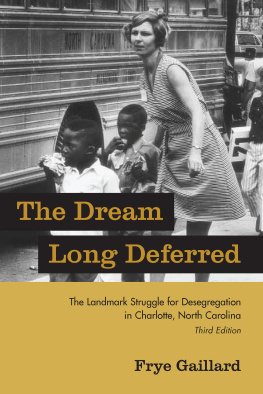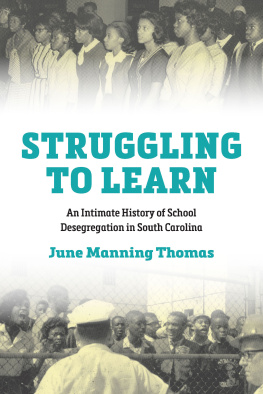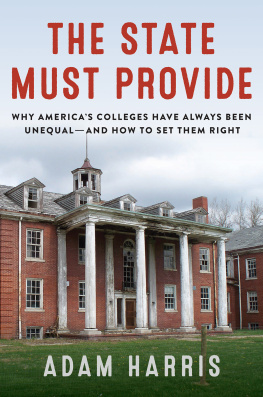Desegregating Private Higher Education in the South
Desegregating Private Higher
Education in the South
DUKE, EMORY, RICE,
TULANE, AND
VANDERBILT
Melissa Kean
Published by Louisiana State University Press
Copyright 2008 by Louisiana State University Press
All rights reserved
Manufactured in the United States of America
FIRST PRINTING
Designer: Amanda McDonald Scallan
Typeface: Palatino
Typesetter: J. Jarrett Engineering, Inc.
Printer and binder: Thomson-Shore, Inc.
Library of Congress Cataloging-in-Publication Data
Kean, Melissa, 1959
Desegregating private higher education in the South : Duke, Emory, Rice, Tulane, and Vanderbilt / Melissa Kean.
p. cm.
Includes bibliographical references and index.
ISBN 978-0-8071-3358-3 (cloth : alk. paper) 1. College integrationSouthern StatesHistory. 2. Segregation in higher educationSouthern StatesHistory. 3. Private universities and collegesSouthern StatesHistory. I. Title.
LC214.22.S68K43 2008
379.2'630975dc22
2008007397
The paper in this book meets the guidelines for permanence and durability of the Committee on Production Guidelines for Book Longevity of the Council on Library Resources.

For Steve
Contents
1.
Intelligent White Men of the South: The Late 1940s
2.
The Sense of Security No Longer Exists: The Early 1950s
3.
The Backlash against Brown: 1954
4.
Unable to Lead: The Late 1950s
5.
Push Comes to Shove: The Early 1960s
Acknowledgments
I happily acknowledge that I could not have written this book on my own. I would never even have begun it if not for the warm welcome and encouragement I received years ago from the faculty in the History Department at Creighton University, especially Dennis Mihelich, Dick Super, and Ashton Welch. At Rice, first as a graduate student and then as University Historian, I have always been surrounded by able, interesting, and generous colleagues. Many of them have read and commented on pieces of this book. Carl Caldwell offered particularly useful criticism early on. Joel Wolfe and Tom Haskell read chapters, and Randall Hall helped edit the entire manuscript. John Boles, who first suggested the topic to me, has read and commented on every draft.
I am especially grateful to the people who helped me identify the research materials I needed and make productive use of them. Archivists at all these schools guided me through their collections and made me feel welcome. William King and Tom Harkins at Duke, Ann Case and Robert Sherer at Tulane, and Kathy Smith at Vanderbilt were generous with their time and knowledge. Ginger Cain at Emory was especially persistent in tracking down often odd bits of information. I owe a special debt to Nancy Boothe and Lee Pecht at the Woodson Research Center, who gave me the opportunity to explore the Rice University archives in great depth. Bill Barnett and Charles Szalkowski of Baker Botts in Houston helped me find important Rice trial records. Others spent hours talking with me about the intricacies of desegregation on these campuses. Gary Hauk helped provide perspective on Emory, Paul Conkin at Vanderbilt was generous with his time and insights into the history of that institution, and Clarence Mohr offered me aid and comfort from the very beginning of this project. I also talked with some of the participants in the desegregation story, most off the record, a few on it. I visited Harvie Branscomb near the end of his life, and he was very gracious and quite open. Walter Martin also spoke freely about his time at Emory, always with great affection and concern for that institution. The most important person I met in connection with this work, though, was Judson Ward at Emory. Dr. Ward was not merely helpful to me, although he was extraordinarily helpful, but he also showed an unflagging honesty in thinking about these difficult events coupled with a generosity of spirit that I hope is mirrored in this book.
My dear friends Deb MacDonald and Neal Gerstandt have been a constant in my life and have always sustained me in whatever I do. My colleagues on the staff and faculty at Rice have also helped in more ways than I can list. In particular I need to thank Jim Pomerantz, Mary McIntire, Mary Bixby, Lee Pecht, Philip Montgomery, and Amanda Focke. Above all, I will never forget or cease to be grateful for the friendship of the late Gil Whitaker. My husband, Steve Kean, and our daughters, Maggie and Nora, never stopped being curious and excited about this book, which made it possible for me to complete it.
Desegregating Private Higher Education in the South
Introduction
T his is a story about how a group of very powerful peoplethe leaders of the Souths elite private universitiescame to do something that many of them did not want to do: admit black students. This story is quite different from the one that played out in the regions public institutions. Here, no federal court ordered these schools to admit black students; no troops or marshals arrived to enforce desegregation. However, to suggest that desegregation at Duke, Emory, Rice, Tulane, and Vanderbilt was voluntary would be deeply misleading. The desegregation of the private universities in the South was coercedby northern foundations, professional academic associations, accrediting bodies, faculties that began to vote with their feet, divinity students and professors who felt called to oppose racial discrimination, alumni who withheld contributions, and by new federal contracting rules. Ultimately, behind all these pressures was the grassroots civil rights movement, led by southern blacks, which created a national crisis of conscience.
Before the schools bowed to the inevitable, though, each one endured nearly two decades of internal argument about how best to respond to these demands for change. The arguments ran hot and cold, touched on everything from global politics to personal antipathies and friendships, and revealed the same serious divide within the power structure of each university. This divide was partly the product of contemporary conditions. As changes of every sort swept through the postwar South, many, especially among the university trustees, fought to hold on to the world they had been born into. At the same time, the presidents of these schools struggled to seize the opportunities presented by so much change to force their slow-moving institutions into the national mainstream. Other aspects of this divide were more lasting and are perhaps even permanent features of American higher education. The American reliance on outside trustees as the final arbiters of university policy leaves these institutions in the well-meaning hands of alumni who often do not share the values, or even any meaningful understanding, of the world of scholarship and instruction. These boards are usually (often overly) cooperative with administrative leaders when it comes to managerial decisions about running a research university, matters on which administrators have acknowledged expertise. On broad issues of mission, goals, and policy, however, trustees commonly feel themselves on firmer ground and more forcefully assert their preferences. On the campuses of these five schools, the conflict over segregation that followed World War II gradually escalated into a direct clash between the needs of the academic enterprise and the values of the outside community.










